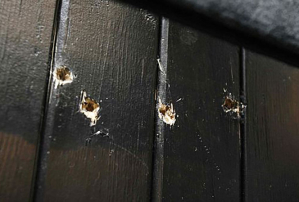
Death row prisoners in Utah could now face firing squads as a backup after the governor of that state signed a bill on Monday that allowed for the option to be available to them.
According to Steve Almasy and Dana Ford of CNN, Utah Gov. Gary R. Herbert issued a statement that reaffirmed that lethal injections were the primary method for carrying out executions in his state. If the lethal drugs are not available, the firing squad would be deployed as a substitute.
"Those who voiced opposition to this bill are primarily arguing against capital punishment in general and that decision has already been made in our state," governor spokesman Marty Carpenter said. "We regret anyone ever commits the heinous crime of aggravated murder to merit the death penalty and we prefer to use our primary method of lethal injection when such a sentence is issued."
Carpenter added that "when a jury makes the decision and a judge signs a death warrant, enforcing that lawful decision is the obligation of the executive branch."
According to CNN, Utah banned death by firing squad in 2004. However, the last execution carried out by the state, which happened in 2010, was carried out by firing squad.
According to a report from the Associated Press, the governor, who is a Republican, argued that Utah needed a backup execution method in case the shortage of lethal injection drugs continued. The governor also noted that other states have alternative execution methods that are allowed in their legal systems.
"In Washington state, inmates can request hanging. In New Hampshire, hangings are fallback if lethal injections can't be given," AP wrote. "And an Oklahoma law would allow the state to use firing squads if lethal injections and electrocutions are ever declared unconstitutional."
The Associated Press reported that no such legal caveat exists in Utah's latest approval of firing squads. The bill's sponsor, state Rep. Paul Ray (R-Clearfield), argued that a team of trained marksmen was a more decent way to die as opposed to "drawn-out deaths" that can happen with both successful and failed lethal injections.
Death penalty opponents argued to the Associated Press that firing squads were barbaric. In addition, the American Civil Liberties Union described the execution practice detailed in Utah's bill as "backward and backwoods."
According to the Associated Press, the state does not currently have any lethal injection drugs on hand for the next execution. Death row inmates could get the firing squad if the state fails to secure such drugs 30 days before their execution date.







